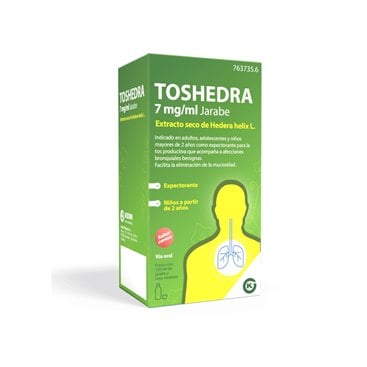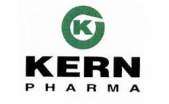Toshedra 7mg/ml Syrup 150ml
Toshedra is a herbal medicine used as an expectorant for productive coughs that accompany benign bronchial conditions. It facilitates the removal of mucus. Toshedra is indicated for adults, adolescents and children over 2 years of age.
Toshedra is a herbal medicine used as an expectorant for productive coughs that accompany benign bronchial conditions. It facilitates the removal of mucus. Toshedra is indicated for adults, adolescents and children over 2 years of age.
Toshedra (7 Mg/Ml Syrup 150 Ml)
Dry extract of Hedera helix L. (ivy)
ACTION AND MECHANISM
Expectorant. Ivy has expectorant and antispasmodic effects, probably due to its saponin heteroside (hederaglucoside) content. The mechanism by which these act is unknown.
INDICATIONS
Herbal medicine used as an expectorant for [PRODUCTIVE COUGH] in adults, adolescents and children over 2 years of age.
POSOLOGY
"TOSHEDRA"
-Syrup
Adults and adolescents over 12 years: 5 ml of syrup (35 mg of extract), 3 times a day.
Children between 6 and 12 years of age: 5 ml of syrup (35 mg of extract), 2 times a day.
Children 2 to 5 years: 2.5 ml of syrup (17.5 mg of extract), 2 times a day.
- Envelopes
Adults and adolescents over 12 years: 5 ml of syrup (1 sachet, 35 mg of extract), 3 times a day.
Children between 6 and 12 years of age: 5 ml of syrup (1 sachet, 35 mg of extract), 2 times a day.
DOSAGE IN RENAL FAILURE
No specific dosage recommendations have been made.
DOSAGE IN LIVER FAILURE
No specific dosage recommendations have been made.
RULES FOR CORRECT ADMINISTRATION
- Syrup: shake the bottle well before each dose. It is recommended to drink a glass of water after each dose and drink plenty of water during treatment.
Administration with food : may be taken with or without food.
- Syrup: shake before use.
ADVICE TO THE PATIENT
- Drink plenty of water during treatment.
- Do not use cough suppressants containing codeine or dextromethorphan while using ivy.
- Consult your doctor and/or pharmacist if symptoms worsen or do not improve within 5 days, or if any of the following appear:
dyspnea, fever, headache or purulent sputum.
- Do not take this medicine if you are fructose intolerant.
CONTRAINDICATIONS
- Hypersensitivity to ivy, any plant of the Araliaceae family or any other component of the medication.
- Children < 2 years. Risk of bronchial obstruction.
PRECAUTIONS
- Gastric damage. Administration of mucolytics has been associated with disruption of the gastric protective barrier and gastric damage. Consider their use in patients with a history of [GASTRITIS] or [PEPTIC ULCER].
- Patients with [ASTHMA], [RESPIRATORY FAILURE] or history of [BRONCHIAL SPASM]. Increased mucus production may lead to bronchial obstruction in patients in whom expectoration is not adequate.
PRECAUTIONS REGARDING EXCIPIENTS
- This medicine contains sorbitol. Patients with hereditary [FRUCTOSE INTOLERANCE] should not take this medicine.
SPECIAL WARNINGS
- The use of mucolytics and expectorants in children under 2 years of age is contraindicated due to the risk of bronchial obstruction.
- Persistent or recurrent cough in children aged 2 to 4 years should be diagnosed by a doctor before starting treatment.
- Concomitant use with other antitussives such as codeine or dextromethorphan is not recommended without prior medical consultation.
INTERACTIONS
- Combination of antitussives containing codeine, dextromethorphan or ivy extracts due to risk of bronchial obstruction and neurotoxic effects. Avoid this combination, especially in children.
- Anticholinergics (atropine, antihistamines, tricyclic antidepressants, antiparkinsonian drugs, neuroleptics, MAOIs). They may oppose the effect of ivy.
PREGNANCY
Safety in animals : No data available.
Safety in humans : There are no adequate and well-controlled studies in humans. Its administration is only accepted if there are no safer therapeutic alternatives, and the benefits outweigh the possible risks. Its use is not recommended.
Effects on fertility : No specific studies have been conducted on its effects on fertility.
LACTATION
It is unknown whether it is excreted in milk, and the consequences this could have for the infant. It is recommended to stop breastfeeding or avoid its administration.
CHILDREN
The use of mucolytics in children under 2 years of age has been associated with the appearance of bronchial obstruction, as a consequence of the increased production and fluidification of bronchial secretion and insufficient bronchial drainage. Therefore, the use of mucolytics in these children is contraindicated.
In older children, the pharmaceutical form and dosage should be adapted to the child's age ( see Dosage ).
ADVANCED AGE
No specific problems have been described in the elderly that require dosage adjustment.
EFFECTS ON DRIVING
It is not likely to affect the ability to drive or use machines.
ADVERSE REACTIONS
Adverse reactions are described according to each frequency interval, considered to be very common (>10%), common (1-10%), uncommon (0.1-1%), rare (0.01-0.1%), very rare (<0.01%) or of unknown frequency (cannot be estimated from the available data).
- Digestive: frequent [NAUSEA], [VOMITING], [DIARRHEA].
- Allergic: uncommon [HYPERSENSITIVITY REACTIONS], with [URTICARIA], [EXANTHEMATIC ERUPTIONS] or [DYSPNEA].
ADVERSE REACTIONS RELATED TO EXCIPIENTS
Patients with hereditary fructose intolerance should not take this medicine.
- This medicine contains sorbitol. Daily doses of more than 10 g of sorbitol orally may have a slight laxative effect and may lead to [DIARRHEA].
OVERDOSE
Symptoms: In case of overdose, an increase in adverse reactions, especially of a digestive nature (nausea, vomiting, diarrhea), and the appearance of agitation, can be expected.
Treatment: symptomatic.



